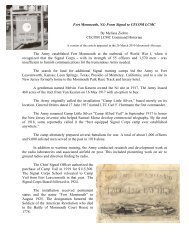Historical Perspective - CECOM - U.S. Army
Historical Perspective - CECOM - U.S. Army
Historical Perspective - CECOM - U.S. Army
Create successful ePaper yourself
Turn your PDF publications into a flip-book with our unique Google optimized e-Paper software.
<strong>Historical</strong> <strong>Perspective</strong>: Pregnancy in the Military<br />
By Melissa Ziobro, <strong>CECOM</strong> LCMC Command Historian<br />
A version of this article ran in the 15 January 2010 Monmouth Message<br />
A flurry of media attention recently surrounded Major General Anthony Cucolo, who commands<br />
Multi-National Division — North (Iraq). Stars and Stripes reported last month that Cucolo made<br />
pregnancy a violation of military law in northern Iraq shortly after he assumed command in<br />
November 2009.<br />
The ban was part of General Order No. 1,<br />
which also barred U.S. troops and civilians<br />
attached to the military from consuming<br />
alcohol and possessing pornography. It did<br />
not ban sex.<br />
Cucolo said he instituted the ban to prevent<br />
the loss of valuable female Soldiers, since<br />
troops who become pregnant are sent<br />
home.<br />
MG Anthony Cucolo, commander of Task Force Marne<br />
and Command Sgt. Maj. Jesse Andrews, command<br />
sergeant major of the task force, uncase the colors at the<br />
Multi-National Division - North transfer of authority<br />
ceremony at Contingency Operating Base Speicher, Iraq,<br />
Nov. 3. The ceremony was the official handover of the<br />
northern Iraq area of operations from the 25th Infantry<br />
Division to the 3rd Infantry Division headquarters staff.<br />
U.S. <strong>Army</strong> photo<br />
Cucolo explained in a now widely<br />
disseminated statement sent to the troops<br />
under his command, “I need every Soldier<br />
I've got, especially since we are facing a<br />
drawdown of forces during our mission.<br />
Anyone who leaves this fight earlier than<br />
the expected 12-month deployment creates<br />
a burden on their teammates…Anyone who<br />
leaves this fight early because they made a<br />
personal choice that changed their medical<br />
status -- or contributes to doing that to<br />
another -- is not in keeping with a key<br />
element of our ethos.”<br />
Stars and Stripes explained “that though<br />
any violation of the ban, which applies<br />
only to those under Cucolo, could<br />
theoretically be punished by court-martial<br />
and jail time, he said disciplinary actions<br />
are being handled at a lower level.”<br />
As of December 22, Stars and Stripes reported that seven U.S. Soldiers, including three men, had<br />
already been punished under the new rule.
The four Soldiers who became pregnant, as well as two male Soldiers, were given letters of<br />
reprimand that would not remain a part of the permanent military file.<br />
The third male Soldier, a married noncommissioned officer who impregnated a subordinate who<br />
was not his wife, was also charged with fraternization and given a permanent letter of reprimand.<br />
One of the female Soldiers declined to say who impregnated her and the unit “let it drop,”<br />
Cucolo said, adding that he had no plans to further investigate paternity.<br />
“I’m in a war zone,” he said. “I don’t have time for that.”<br />
Stars and Stripes also reported that Cucolo said he discussed the ban with his commanders,<br />
including a female battalion commander and a command sergeant major, and all agreed<br />
“wholeheartedly.” The unit had experienced a number of pregnancies prior to its deployment, he<br />
said.<br />
“I can’t tell you how valuable my female Soldiers are,” Cucolo said. “They fly helicopters. They<br />
run satellites. They’re mechanics. They’re medics. Some of the best intelligence analysts I have<br />
happen to be female. You start losing them when you’re facing a drawdown, and you really hurt<br />
the unit.”<br />
Cucolo said the order had been vetted by his legal advisers. The inspector general for Iraq, Col.<br />
David Thompson, said the order was legal, according to Stars and Stripes.<br />
No other units in Iraq had similar rules on pregnancy, military officials said. A spokesman for<br />
U.S. forces in Afghanistan said there was no pregnancy ban there.<br />
MG Cucolo’s order might have been more contentious at home than in Iraq.<br />
Stars and Stripes reported four U.S. senators asked <strong>Army</strong> Secretary John McHugh to rescind<br />
Cucolo’s policy regarding pregnancy, saying it “defies comprehension.”<br />
The request came from Sens. Barbara Boxer, Barbara Mikulski, Jeanne Shaheen and Kirsten<br />
Gillibrand.<br />
An equally appalled Terry O’Neill, President, National Organization for Women, said on NBC<br />
Nightly News, “It’s a dumb move. You don’t punish women for becoming pregnant… Those<br />
policies are wrong. They are demeaning to women. They are very dangerous.”<br />
To this, MG Cucolo replied, “I got it. Here’s the deal. I am the one responsible and accountable.<br />
The National Organization for Women is not. Critics are not. I have to accomplish a very<br />
complex mission.”<br />
Cucolo clarified though, that “I have not ever considered court martial for this. I do not ever see<br />
myself putting a Soldier in jail for this.”
ABC’s World News with Diane Sawyer reported support for MG Cucolo even from women<br />
currently serving. “The women in my unit wholeheartedly support this,” said one blog post. “We<br />
are tired of being lumped in with the women who are not taking proper care to not become<br />
nondeployable.”<br />
The show reported that one former female Soldier said pregnancy used to be a “get-out-of-jailfree<br />
card” only available to women, so, in her view, this policy actually made women and men<br />
more equal.<br />
Cucolo’s controversial policy was eventually rescinded under an order from the top U.S.<br />
commander in Iraq, General Raymond Odierno, when Odierno drafted a broad new policy for the<br />
U.S. forces in Iraq that took effect 1 January 2010. The new general order issued by General<br />
Odierno, which followed a full review of existing orders, consolidates and replaces several<br />
general orders from United States commanders across Iraq. Odierno’s order does not include a<br />
pregnancy provision, according to the Associated Press.<br />
The issue of what to do about pregnancy amongst female Soldiers is not new, and can be traced<br />
back easily to World War II.<br />
When manpower shortages during that conflict necessitated the use of women, Congress<br />
established the Women’s <strong>Army</strong> Auxiliary Corps (WAAC) with Public Law 554 on 14 May<br />
1942. This allowed women to serve “with,” not “in,” the <strong>Army</strong>. The Center of Military History’s<br />
The Women's <strong>Army</strong> Corps, 1945-1978 reports that under auxiliary status, a woman, married or<br />
single, who became pregnant was promptly separated from the service and given an honorable<br />
discharge.<br />
The WAAC gave way to the Women’s <strong>Army</strong> Corps (WAC) in 1943. This made women a part of<br />
the <strong>Army</strong> as opposed to an auxiliary thereof. According to The Women's <strong>Army</strong> Corps, 1945-1978<br />
“When the Corps became part of the <strong>Army</strong>, the War Department found it had no authority to<br />
discharge personnel for pregnancy.” The Legislation for the traditional all-male <strong>Army</strong> provided<br />
many grounds for discharge-minority, dependency or hardship, bad conduct, mental disability,<br />
medical disability, unfitness, and inaptitude, as well as expiration of time in service (ETS). None<br />
of these reasons in a traditional interpretation covered pregnancy. The <strong>Army</strong>, however, resolved<br />
the problem by including pregnancy as a cause for a medical discharge.<br />
So, members of the WAC who became pregnant could be legally discharged. The Women's <strong>Army</strong><br />
Corps, 1945-1978 explains that “If a woman became pregnant overseas, she was evacuated by<br />
air to the United States. If birth occurred before a woman could be discharged for medical<br />
disability, she was discharged on the grounds of dependency of a minor child. If the child were<br />
stillborn, the woman was discharged for ‘the convenience of the government.’ An illegal<br />
abortion, however, resulted in a dishonorable discharge for bad conduct.”<br />
Congress passed The Women’s Armed Service Integration Act (WASIA) in 1948. The purpose<br />
of WASIA was to determine the status of women in the post-WWII Armed Forces and how they<br />
would be accepted. A provision of WASIA stated that women would be “automatically
discharged upon pregnancy or if they acquired children under 18 years of age by either marriage<br />
or adoption.”<br />
According to the U.S. <strong>Army</strong> Women's Museum, it was not until 9 April 1971 that women had<br />
the option of remaining in the service during pregnancy and after. As of that date, <strong>Army</strong><br />
regulations permitted WAC to request waivers for retention on active duty if married or<br />
pregnant. Then, on 30 June 1975, the Secretary of Defense directed elimination of involuntary<br />
discharge of military women because of pregnancy and parenthood.<br />
This meant pregnant women remained in service unless they asked to get out (whereas with the<br />
1971 change in policy, pregnant women could ask to stay in).<br />
Women can now remain in the service after giving birth, adopting, or becoming a step parent by<br />
marriage, although as stated previously, pregnant women leave the war zone. Both male and<br />
female sole parents must sign a statement regarding deployment provisions or a dependent care<br />
plan.<br />
Major General Anthony Cucolo’s recent edict is the just the latest example of the military’s<br />
varied historic responses to pregnancy.

















